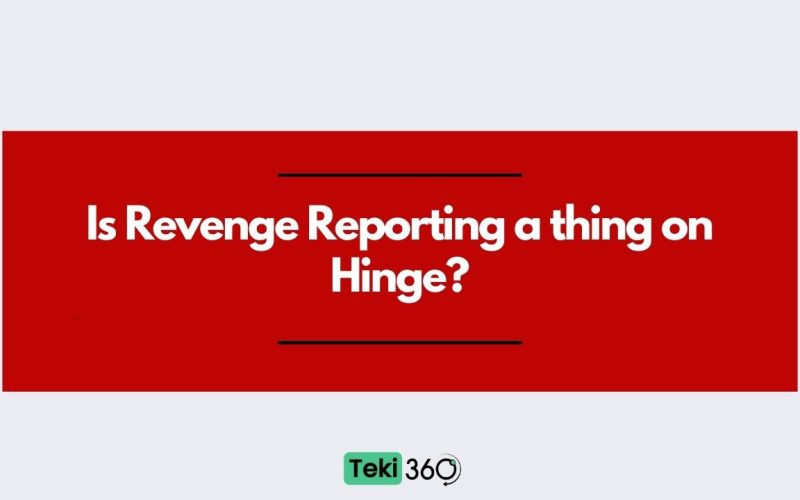As an Amazon Associate, I may earn a small commission from qualifying purchases. Learn more about this.
Table of Contents Show
Love laughs, and a bit of drama – that’s what we all signed up for on Hinge.
But amidst the emojis and pick-up lines, I found something odd: ‘Revenge Reporting.’
Buckle up, as I take you through this bumpy side of dating and whether or not it’s a thing on Hinge.
What’s Revenge Reporting on Dating Apps?
When we talk about online dating, we often discuss the obvious challenges: the catfishes, the never-ending swiping, the awkward first dates, or even the heartbreaks.
However, there’s an undercurrent that many of us aren’t aware of, a trend that’s as subtle as it is insidious – revenge reporting.
Imagine going on a date, and maybe it doesn’t end too well for various reasons.
Instead of moving on, one person decides to get back by misusing the reporting feature. This act is where ‘Revenge Reporting’ gets its name.
Yep, that’s the gist.
Why does it matter? Well, if enough reports are filed against a user, their account might be temporarily suspended or even permanently banned.
This means that innocent users can find themselves pushed out of the platform, all because someone didn’t like a joke they made, felt jilted after a date, or simply wanted to lash out.
Now, I get it.
Emotions can run high, especially in the world of dating.
But using the report button as a weapon of personal vengeance?
That’s a new level of drama that many of us didn’t see coming.
It’s important to be aware of this trend, especially if you’re actively dating online.
You’d want to ensure that you’re not just protecting your heart but your profile too.
Plus, from a broader perspective, this trend can overload the system.
Imagine sifting through heaps of these spiteful reports if it actually becomes a real trend; it’s a waste of time and resources that could be used to investigate genuine cases of misconduct or abuse.
This misuse of the reporting feature can dilute actual issues, making the app less safe and enjoyable for everyone.
Is Revenge Reporting a thing on Hinge?
You know, when I first started using Hinge, the term ‘Revenge Reporting’ wasn’t even on my radar.
Sure, I knew about ghosting and catfishing, but this? It was a curveball.
So, Is ‘Revenge Reporting’ really a thing on Hinge?

To find the answer, I took a deep dive into online discussions, forums, and user feedback. It turns out, it’s not just a made-up term.
Several users have shared their experiences of suddenly finding their accounts flagged or suspended. Their best guess?
They’d recently turned down a date or ended a conversation they felt wasn’t going anywhere. Not long after, bam! They’re facing repercussions for what seems like no valid reason.
So their guess is, that they were revenge reported.
But is this applicable to Hinge? How common?
Well, every report on Hinge is still reviewed by the app’s moderation team.
These teams usually review the case and, in many instances, if there’s no evidence of misconduct, the reported profile won’t face any penalties.
Post-action for reports is only made if the reason behind the report is valid and actually factual.
However, if someone is frequently reported, or if the moderation team isn’t able to clearly determine the veracity of the reports, it might result in the suspension or banning of the profile, even if the reports were made in bad faith.
For a report just made out of revenge, this is unlikely to be the case.
To mitigate revenge reporting, most platforms, Hinge included, have systems in place to identify and manage false reports, but the effectiveness can vary.
For instance, during the review process, the context behind interactions is often considered.
If a report doesn’t coincide with the actual conversation or interaction history, the moderation team may recognize this inconsistency and understand that the report could be made in bad faith.
However, in weird cases, things could slip.
But then, If someone feels they were unjustly banned due to false reports, reaching out to Hinge’s customer support for an appeal or further investigation would be the recommended course of action.
Related: Can you report someone for ghosting?
What to do if you feel you got revenge reported?
First, understand that this isn’t an indictment of your character. It’s a hiccup, and hiccups can be handled.
The key here is to respond, not react. Hinge, like most user-based platforms, has protocols for situations like these.
Your best bet?
Reach out to Hinge customer support.
Explain your situation calmly, clearly, and concisely.
Include specifics if you can – when did you notice the issue, were there any heated exchanges before your account faced issues, any screenshots, and so on.
The more information you provide, the easier it will be for them to investigate.
While waiting for a response, take a look at your recent interactions.
‘Revenge Reporting’ often follows a clash, a disagreement, or a rejection. Did something go off-rails recently?
This isn’t about fault-finding but understanding. If a conversation may have been misinterpreted, it gives you a clearer narrative to share with the support team.
Once Hinge gets back to you – and they usually do – follow their instructions to the letter. Sometimes, they might require identity verification or additional information. Cooperate.
This is your chance to clarify misunderstandings.
But what if you’re back on the app, yet feeling a bit rattled? It’s normal. Take it slow. Maybe reassess your interaction strategies.
And remember, ‘Revenge Reporting’ is more about the person making the false report than about you.
But what if Hinge doesn’t accept your appeal?
Now, nobody wants this to happen, and hopefully, it doesn’t happen to anyone out there.
But what if?
One route is creating a new account.
Now, this isn’t a foolproof or recommended method because Hinge, like most platforms, has mechanisms to prevent banned users from immediately hopping back on.
They do this to maintain a safe community. However, if you believe in good faith that you’ve been unjustly barred, starting afresh might be an option.
If you decide to go down this path, you’ll need a new set of credentials.
If your account was linked to your phone number, using a new number is a start.
There are online services that provide numbers for verification purposes, but tread carefully and choose a reputable one. Ensure it’s a service that respects your privacy and data security.
Creating a new email address for this account is also wise since platforms often flag associated emails of banned accounts.
As you set up your new profile, be honest. The goal isn’t to deceive but to start afresh. Use your real name, photos, and details.
However, remember that this approach should be a last resort and used responsibly. Misusing new accounts to violate community standards or harass other users defeats the purpose of the platform.
If you’re continually facing issues, it might be a sign to explore other avenues for digital dating. There’s a world of apps out there, each with its own vibe and community.
Who knows? Maybe your true love story begins on a platform you’ve yet to explore.
Conclusion
Revenge Reporting’ on platforms like Hinge is just one facet of the experience.
While it’s vital to be aware of such issues and understand the steps to take if they arise, it’s equally important not to let these challenges overshadow the primary goal: meaningful connection, since for some reason, they’re not always applicable and can be difficult to pull out on a platform like Hinge.






